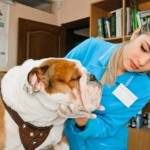 According to a recent report in an American Veterinary Medical Association newsletter, there’s been a recent upsurge in kennel cough in Bend, Oregon. In fact, some veterinarians are seeing as many as 25 cases of dogs with kennel cough each week. This time last year, the average was 5. What’s happening in Oregon could certainly happen in Northern Colorado. The best prevention is a little knowledge and acting on that knowledge. Here’s what you should know to protect your pup.
According to a recent report in an American Veterinary Medical Association newsletter, there’s been a recent upsurge in kennel cough in Bend, Oregon. In fact, some veterinarians are seeing as many as 25 cases of dogs with kennel cough each week. This time last year, the average was 5. What’s happening in Oregon could certainly happen in Northern Colorado. The best prevention is a little knowledge and acting on that knowledge. Here’s what you should know to protect your pup.
What Is Kennel Cough?
If your dog has kennel cough, whose medical name is canine infectious tracheobronchitis, you’ll quickly know it by the constant dry hacking cough that sounds like a goose honking. However, kennel cough is not just one specific disease, but rather a group of viral and bacterial upper respiratory pathogens that are highly contagious. These pathogens, most frequently parainfluenza virus or Bordetella bacteria, attack the lining of the respiratory tract, which leads to irritation of the airways and the typical dry cough.
Kennel cough can be spread in several ways–through the air when an animal coughs, by direct contact with an infected dog, or by sharing contaminated objects like toys or water bowls. It occurs most frequently in places where dogs are exposed to other dogs, such as kennels, animal shelters, dog shows, pet shops and dog parks.
How Is It Treated?
Treatment will depend on how severe the symptoms are. In many cases, the cough will run its course in 7-10 days and no treatment is necessary. See your veterinarian at the first signs of the cough. In older dogs or those with a weakened immune system, your vet may recommend cough suppressants and antibiotics—or nothing at all. Monitor your pup and if he doesn’t get better in 2 or 3 weeks, he needs to see the doctor again as the disease can sometimes turn into pneumonia. Make sure to isolate your sick dog from others to prevent the spread of the disease.
How Do You Prevent It?
Of course the best treatment is prevention. Make sure your dog’s vaccinations are up to date. The typical yearly vaccine can help protect against some of the kennel cough pathogens. If you will be taking your dog to a boarding kennel, dog show, day care, etc., request a Bordetella vaccine for added protection. In fact, most such places require proof of these vaccinations to help prevent spread of the disease. However, that being said, no vaccine can guarantee your pup won’t be infected, especially since there is not just one pathogen, but it will drastically cut down on the chances of infection and the severity if he does become infected.
If you’ve noticed your dog has a dry hacking cough, or if you plan to board your pup or take him to obedience classes, give Powell Veterinary Service a call at 970-352-9164 and we’ll get your furry friend taken care of.

WORKING HOURS:
Monday-Friday 8:00am - 5:00pm
Saturday 8:00am - 12:00 noon